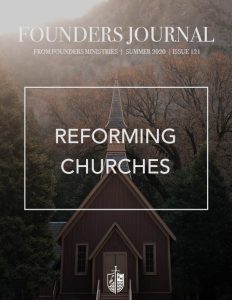As a young man feeling the call of God to enter the pastorate, I was blessed with good role models who demonstrated that full-bodied work. They taught me the essence of what George Herbert, in The Country Parson, said, “A pastor is the deputy of Christ for the reducing of man to the obedience of God.”[1] This was my firm mandate.
When I first met a friend of mine I noticed he carried a black leather-bound book with him, which I assumed was his Bible. I thought, “What a spiritual man, always carrying his Bible.” I soon discovered it was a copy of the 1689 Baptist Confession. I began questioning our relationship. Eventually, he gave me a copy (black, leather-bound, of course) and I have loved it and used it as a guide to Christian ministry ever since. As I studied its chapters, I discovered a wonderfully concise definition of the symbiotic relationship between the pastor and the church.
The Work of the Pastor
The tenth paragraph of chapter 26 of the Baptist Confession provides the church with a nicely crafted definition of the pastor’s duty. “The work of the pastor being constantly to attend to the service of Christ, in His churches, in the ministry of the Word and prayer, with watching for their souls, as they that must give an account to Him.”[2] The pastor is connected by service, ministry of the Word of God, and prayer to a people for whom he cares. For me, this greatly expanded and refined Herbert’s definition.
From generation to generation pastors have developed methods to express their “service of Christ.” For the seventeenth-century minister, Richard Baxter, it meant catechizing whole families. “The first, and main point, which I have to propound to you, is this, whether it be not the unquestionable duty of the generality of ministers . . . to set themselves presently to the work of catechizing, and instructing individually, all that are committed to their care, who will be persuaded to submit thereunto?”[3]
For the eighteenth-century Scottish minister, James Robe, the pastor’s task was to preach evangelical messages and counsel those seeking salvation. Robe’s ministry took place during the Scottish revival of the 1740s. He said of William McCulloch, who pastored at Cambuslang, “The minister of that parish, in his ordinary course of sermons, for near a twelvemonth before this work began, had been preaching on these subjects which tend most directly to explain the nature, and prove the necessity of regeneration, according to the different lights in which that important matter is represented in the holy scripture.”[4]
Both Baxter and Robe have something in common. They are applying themselves to the ministry of the Word, and prayer to the people over which God had placed them. For Baxter it meant catechizing and for Robe it was evangelistic preaching, but both were creatively shaping their duties to fulfill their calling.
Alfred Poirier, writing in the twentieth-century says, “. . . if we are called to the pastorate, we must recapture the full-blooded humanity of Christ’s own pastoral person and ministry, particularly as our great Peacemaker. Failure to train our people and our leaders as peacemakers is a failure in Christology, for peacemaking is Christology.”[5] If we add Poirier to Baxter and Robe we can see the multifaceted nature of pastoral ministry. Each of these expressions fit into the Confession’s summary of the work of the pastor.
No matter how these efforts manifest themselves they all conform to the Spirit’s work for the church through the agency of the pastoral office. The men quoted here are just a few of the voices who down through the ages have watched for the souls of their people. A holy work in the service of Christ.
The Churches to Whom They Minister
The work of the pastor does not stand alone but is dependent upon the congregation served. The Hebrew evangelist expresses this symbiotic relationship, “Obey them that have the rule over you, and submit yourselves: for they watch for your souls, as they that must give account, that they may do it with joy, and not with grief: for that is unprofitable for you” (Heb 13:17).[6]
The 1689 Baptist Confession places members’ duties in clear terms. It is incumbent on the churches to whom they minister, not only to give them all due respect, but also to communicate to them of all their good things according to their ability, so as they may have a comfortable supply, without being themselves entangled in secular affairs; and may also be capable of exercising hospitality towards others.”[7] The authors of the Confession invested a wealth of thought and practicality into a biblically spiritual statement which reflects the heart of God for the church.
Just as the pastor has a duty to exercise his service of Christ through the ministry of the Word and prayer so the church member has a responsibility, “to give them all due respect.” The Confession references Paul’s letter to Timothy, “Let the elders that rule well be counted worthy of double honour, especially they who labour in the word and doctrine” (1 Tim 5:17).
This idea of showing honor flies in the face of our American form of church life. Joseph Hellerman addresses this in his introduction to When the Church was a Family. “We in America have been socialized to believe that our own dreams, goals, and personal fulfillment ought to take precedence over the well-being of any group—our church or our family, for example—to which we belong.”[8] So many pastors have been fired and their reputations ruined by self-serving members inclined to build their own ecclesiastic empire. We as a community of Christ-followers must work against this trend by intentionally honoring men who have served well.
Our intentionality must include “all good things” not just affirmative words. The apostle writes, “Let him that is taught in the word communicate unto him that teacheth in all good things” (Gal 6:6). The reason for the church’s care of their pastor is summed up by the Confession in these words, “without being themselves entangled in secular affairs; and may also be capable of exercising hospitality towards others.”[9] The modern church faces a dilemma at this point. The bi-vocational, co-vocational pastor is a fact of church life. For the pastor’s adequate supply and an ability hospitably to entertain they often resort to secular employment.
Pastors such as myself have looked to the tentmaking example of Paul (Acts 18:3) as an honored tradition for the service of Christ. Men who work in the marketplace give meaning to the word “vigilant” (1 Tim 3:2). Powered by the Spirit of God they maintain a discipline that keeps them from diminishing their holy occupation. This, however, does not excuse the congregation that could do more for their shepherd. Too often today, the ministry is minimized by groups within the church that reduce the pastor’s function to an affordable line item. This is not how it should be.
The Confession’s Argument Reasoned from Scripture
The Confession concludes this paragraph with a well-reasoned argument drawn from Scripture. “And this is required by the law of nature, and by the express order of our Lord Jesus, who has ordained that they that preach the Gospel should live of the Gospel.”[10] The foundation for this statement is 1 Corinthians 9:6-14 where the apostle established dedicated service by the minister and dedicated care of the man of God by the church. He supports his logic by appealing to the law of nature, the law of Moses, and the teaching of Christ.
The “law of nature” is used as the lowest support for his position. “Who goeth to warfare any time at his own charges? who planteth a vineyard, and eateth not of the fruit thereof? or who feedeth a flock, and eateth not of the milk of the flock?” (1 Cor 9:7). Viewed from this perspective, it is only natural that a man would earn his living from the care of God’s tender flock.
A warning is due at this point. It would be unnatural for a man to be provided for in this way who did not serve well. It is required of pastors, all ministers of the gospel, to walk circumspectly remembering that “we must give an account” of our service. Allow me to draw again on Richard Baxter. “Whereas, if we abound in faith, and love, and zeal, how would it overflow to the refreshing of our congregations, and how would it appear in the increase of the same graces in them! O brethren, watch therefore over your own hearts: keep out lusts and passions, and worldly inclinations; keep the life of faith, and love, and zeal: be much at home, and be much with God.”[11]
This warning is extended to congregations as well. Would a flock, vineyard, or military assignment willingly withhold fruit or due payment? No. The natural order suggests the answer. If it wasn’t for the vine dresser or the shepherd there would be no production. Without the fighting man in the ranks, no war is won. The law of nature makes a powerful argument but lacks the authority Paul is looking for to land his punch.
The argument intensifies as the law of Moses is considered. “For it is written in the law of Moses, Thou shalt not muzzle the mouth of the ox that treadeth out the corn. Doth God take care for oxen?” (1 Cor 9:9). The passage the apostle appeals to is found in Deuteronomy 25:4 to which he adds his own commentary in verses 10–11 and 1 Timothy 5:17–18. He shows that this is meant for the men who serve in sowing, reaping, and laboring in the Word and doctrine. Their care is ordained by God.
Just as in his argument from the law of nature the church is not out of view. The passage in 1 Corinthians is very direct as Paul confronts his audience with their responsibility. “If we have sown unto you spiritual things, is it a great thing if we shall reap your carnal things?” (1 Corinthians 9:11). This is a rhetorical question. The service in spiritual things, in serving Christ, is much greater than the provision laid aside by the congregation.
The imagery of the temple priesthood leads the reader to the final appeal connecting the law of Moses and the teaching of Christ. “Even so hath the Lord ordained that they which preach the gospel should live of the gospel” (1 Cor 9:13; see also Matthew 10:10 and Luke 10:7). The Confession quotes this passage as the highest authority for both the pastor and the church. Such an ordination should be cherished and honored for the glory of God and the furtherance of his gospel.
In every relationship there is a giving and a receiving; responsibility and privilege. The authors of the Confession expressed it in terms of Christian devotion. “And O that, other contentions being laid asleep, the only care and contention of all upon whom the name of our blessed Redeemer is called might for the future be to walk humbly with their God in the exercise of all love and meekness toward each other, to perfect holiness in the fear of the Lord, each one endeavoring to have his conversation such as becometh the Gospel.”[12]
Paragraph 10 is not simply an ecclesiastical reality written to give the church mutual care instructions. It is means of perfecting holiness, fearing God, and advancing the gospel. When pastors and their congregations show “love and meekness toward each other” then will be fulfilled Christ’s command. “A new commandment I give unto you, That ye love one another; as I have loved you, that ye also love one another. By this shall all men know that ye are my disciples, if ye have love one to another” (John 15:34–35).
[1]George Herbert, The Priest to the Temple or, The Country Parson (Amazon.com Services, n.p., 2010), Loc 21, Kindle.
[2]The Baptist Confession of Faith and the Baptist Catechism (Port St. Lucie, FL: Solid Ground Christian Books, 2018), 57–58.
[3]Richard Baxter, The Reformed Pastor, ed. William Brown (1897; repr., Edinburgh: Banner of Truth, 1974), 41–42.
[4][4]James Robe, Narratives of the Extraordinary Work of the Spirit of God, at Cambuslang, Kilsyth, Etc., Begun 1742. Written by James Robe and Others, With Attestations by Ministers, Preachers Etc (Palala Press, 2015), 2.
[5]Alfred Poirier, The Peacemaking Pastor: A Biblical Guide to Resolving Church Conflict (Grand Rapids, MI: Baker Books, 2006), 26.
[6]All scripture quotations are from the King James Version of the Bible unless otherwise noted.
[7]The Baptist Confession, 57–58.
[8]Joseph H. Hellerman, When the Church Was a Family: Recapturing Jesus’ Vision for Authentic Christian Community. (Nashville: B&H Academic, 2009), 4.
[9]The Baptist Confession, 57–58.
[10]The Baptist Confession, 57–58.
[11]Richard Baxter, The Reformed Pastor, 61.
[12]The Baptist Confession, xiv.
























